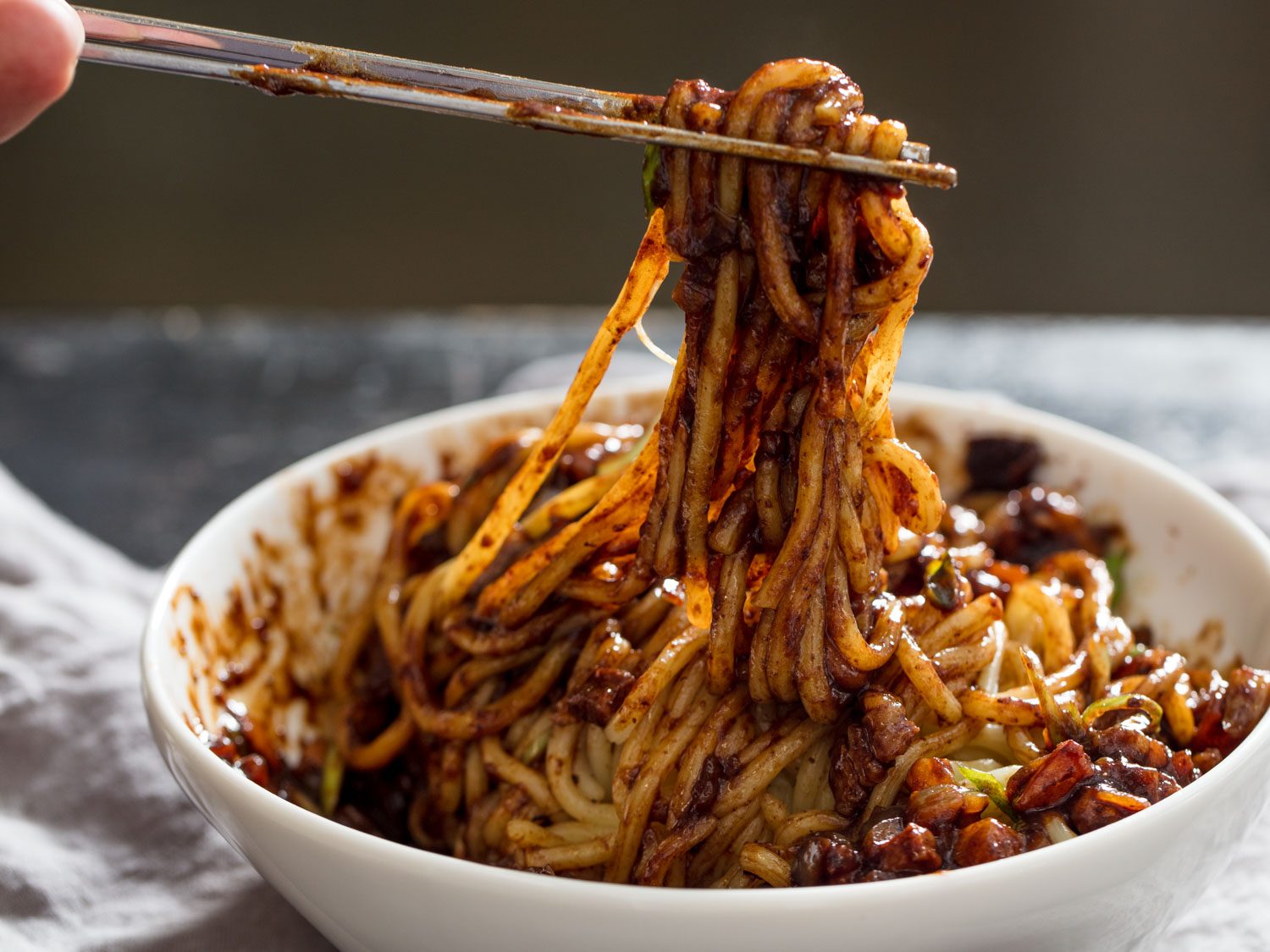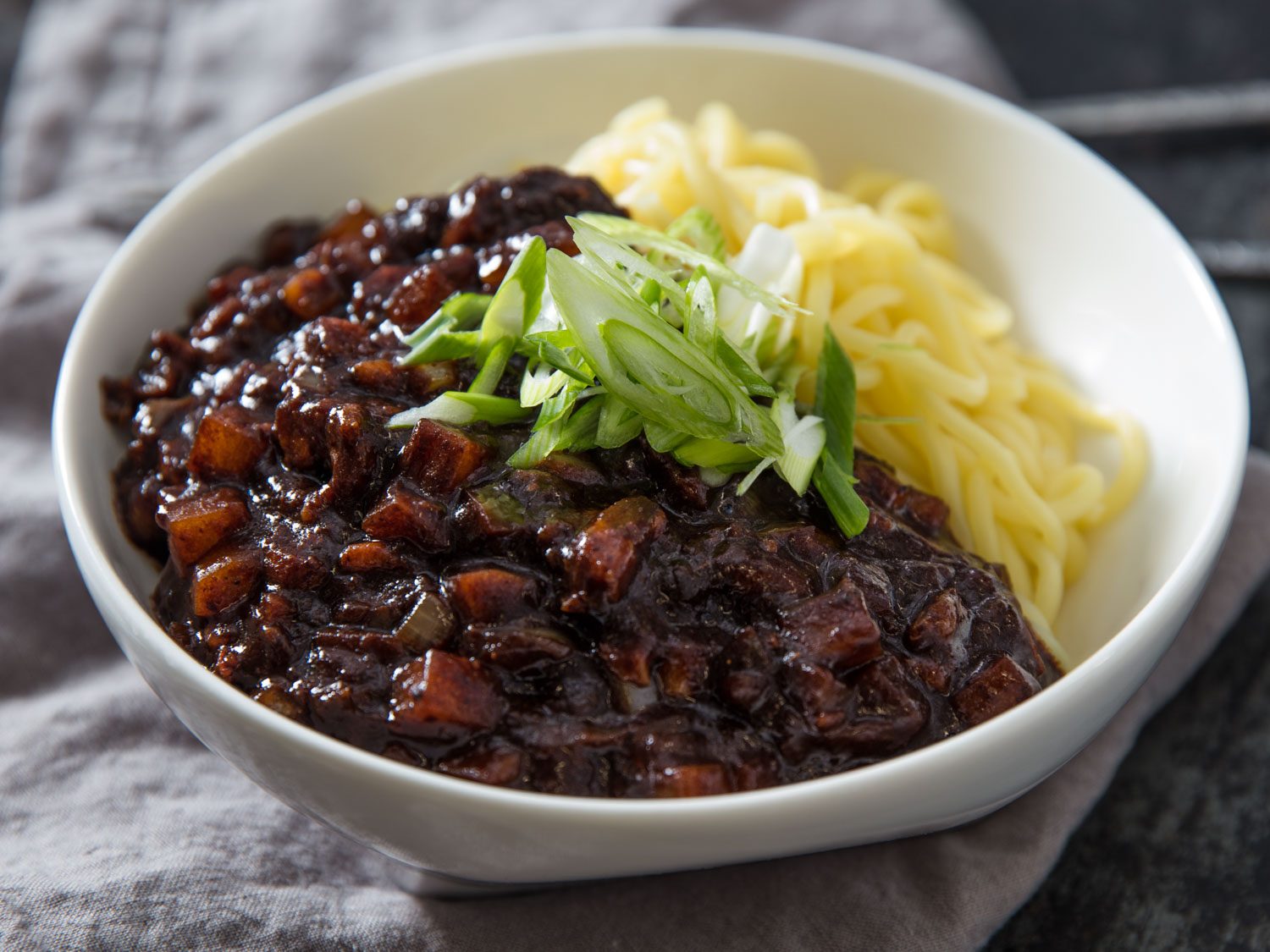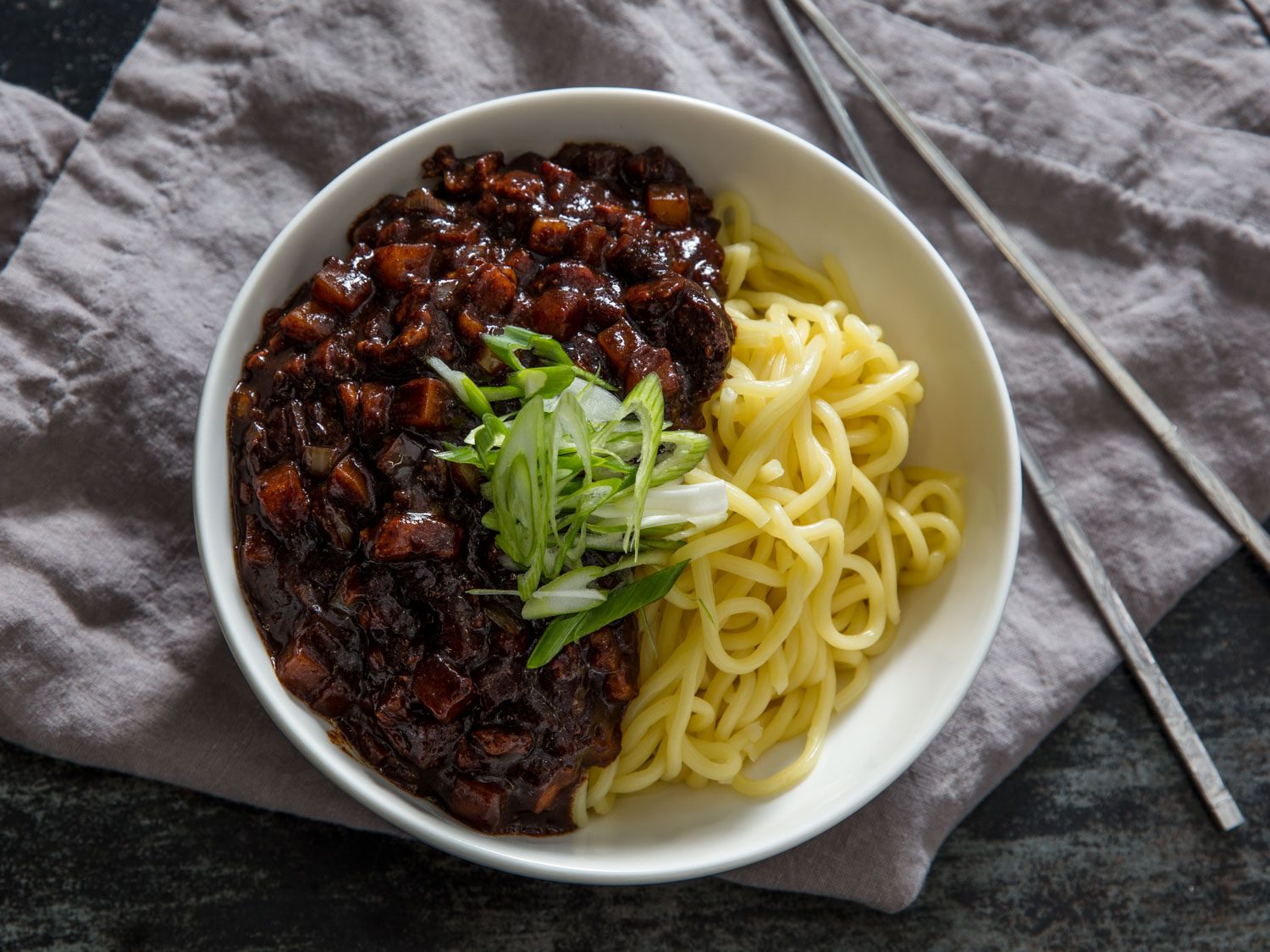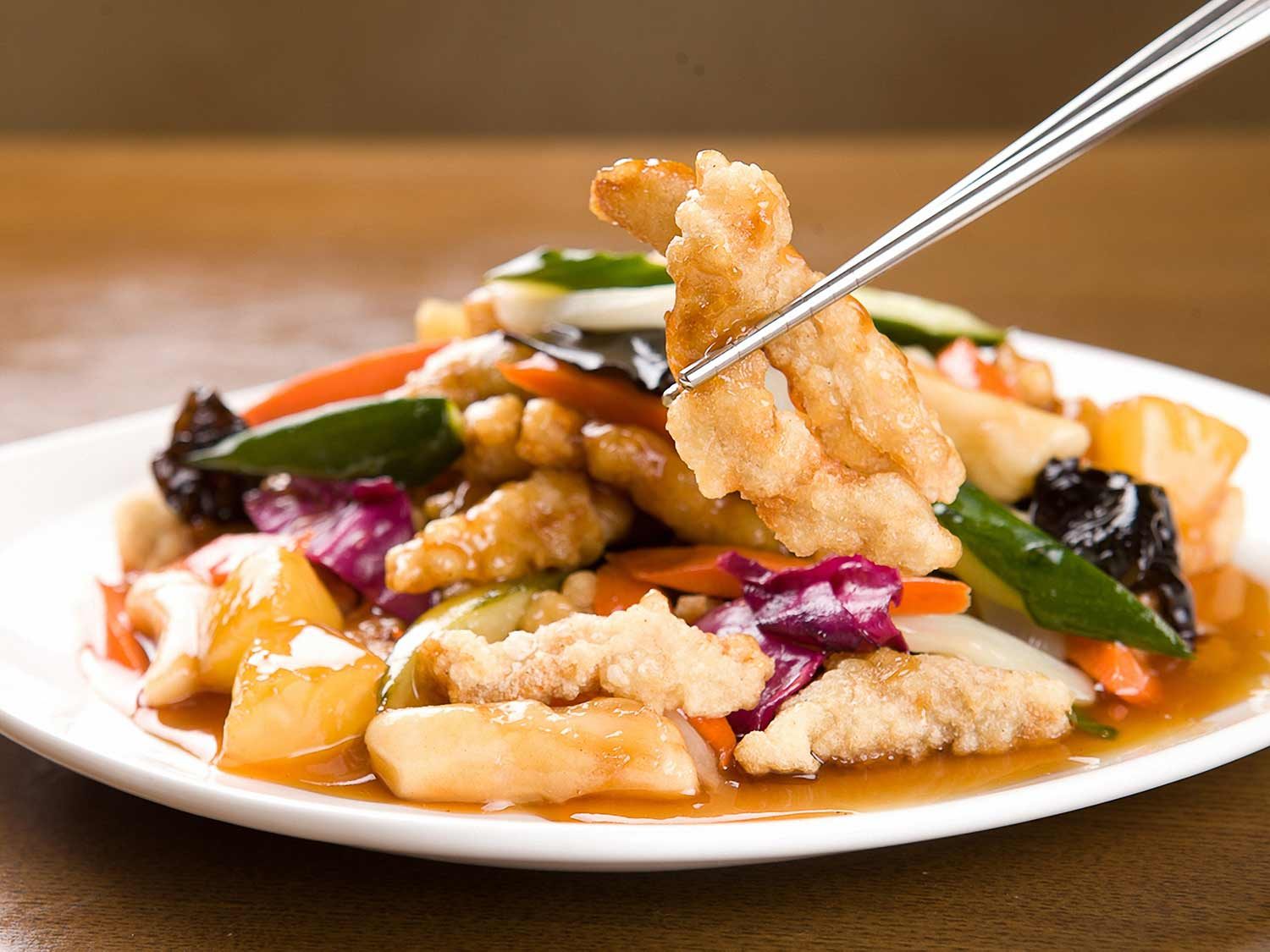
[Photographs: Joel Russo, unless otherwise noted]
On Instagram, a shirtless young man identified only as @hongseokhwa92 half-smiles coyly into the camera for a classically Korean mukbang-style selfie. The caption reads, “Eating and lying down right away! Alone, with Gyo-Chon Honey Combo and one plate of jjajang.”
Swiping to his second photo, the viewer sees the loot on a table: a cardboard box of honey fried chicken and a bowl of jjajangmyeon. The tongue-in-cheek hashtags? “#Eat. #LieDown #KyoChonHoneyCombo #jjajangmyeon #BlackDay #BlackDay #Healthstagram #ManWhoWorksOut #Selfie.”
@Hongseokhwa92 may be single—”alone,” as he puts it—but this type of photo has plenty of company on Instagram. Across romance-obsessed South Korea, the unattached are gearing up for April 14, also known as Black Day, an occasion for soaking up the sorrows of singledom with morbid, dark-hued foods—in particular, jjajangmyeon,* a beloved Chinese-immigrant dish of thick, chewy flour noodles smothered in a hearty, glutamate-rich black bean sauce, often containing pork, potato, zucchini, and onions.
* The name is sometimes spelled jajangmyeon, a version that was chosen by the National Institute of Korean Language in 1986, but colloquially overruled by the popularity of jjajangmyeon with the two initial j‘s, resulting in a sharper pronunciation that some have argued more closely resembles that of the Beijing-based dish, zhajiangmian.
This holiday of commiseration is set exactly two months after Valentine’s Day, when Korean women are encouraged to give the men of their choice chocolates, in the hope of receiving white chocolates or cookies in return on White Day, celebrated on March 14. (Judging by Instagram, some Koreans celebrate Black Day on March 14 instead of April 14, but this isn’t the norm.) Valentine’s Day and White Day are part of a whole class of “couples’ holidays”—one for each of eleven months of the year—to be celebrated only by the lucky pairs blessed with the benevolent smiles of satisfied parents and the jealous sighs of lonely singletons. Those who find themselves uncoupled are granted Black Day as a consolation prize, albeit a delicious one.
Every Korean rite has its associated foods, from the throwing of jujubes and chestnuts to symbolize future children at the post-wedding pyebaek ceremony, to peeling the tops of the favorite fruits of ancestors so that the spirits may easily eat them at jesa ancestor-worship rituals. Black Day, however, is a modern holiday that perpetuates an unusually ironic, rather than earnest, take on food’s place in Korean cultural rites and holidays.

The menu at restaurants celebrating Black Day varies: jjajangmyeon, of course (though it’s a delivery or dine-in favorite all year long, consumption of the black bean noodles goes into overdrive on April 14), or noodles colored black with squid ink; black coffee; and black desserts, often containing chocolate. One cafe has even gone so far as to create a black muffin, and some restaurants host special events and competitions for the singles’ day.
But Gloria Seoyoung, the host of food tour Seoul Foodie Night Out, says she and many singles choose to camp out at friends’ apartments on the holiday, scarfing down jjajangmyeon and tangsuyuk (sweet-and-sour pork). Not only can you get jjajangmyeon from Korean-Chinese restaurants, dropped off at your door via special fast-food delivery motorbikes, humiliated singletons can deposit their sauce-strewn plastic trays and dishes outside their apartments for pickup, never once having to face anyone except the delivery boy/comfort-food savior.
Over time, the holiday has evolved, taking on a tongue-in-cheek tone that allows singles to mock the traditions of cutesy couples while simultaneously rejoicing in and deriding their own singledom. Black Day has become a pop-cultural joke of sorts, even permeating K-pop consciousness, with girl group Pascol releasing a pro-singles song and accompanying video called “Merry Black Day” (enjoy this translation of the lyrics, which calls Black Day “couples’ hell”).
“It’s almost like a self-deprecating joke,” says Summer Jung, a research fellow at Stanford who grew up in Seoul. “[Singles] are commiserating but also celebrating.”
I’d never heard of Black Day until I lived in Seoul, where I dated a sophisticated Korean-Australian-Singaporean man who thoughtlessly crushed my heart like a wingtip extinguishing a Dunhill on the neon-lit Shinchon pavement. This playboy “kicked me” (a literal translation of the Korean phrase for “dumped me”) with this careless but pointed text message: “It’s been nice knowing you and I’m glad we met…by the way, could you introduce me to a blonde American girl before you leave for New York?” Trudging home from my version of psychotherapy, a solo, “Aggretsuko”-style karaoke in my striped track pants and pink hair extensions, I felt oddly broken by a relationship that had never even reached official status.
After I mourned my situation with a native Korean friend, she demanded that I come over for some jjajangmyeon for Black Day. This unni (slang for “older female friend”), who was 32 to my 20, had been single for a decade, and her plan was to circumnavigate the globe solo after graduate school. Sitting in her cramped, cluttered apartment, stacked high with papers and snail creams, we ordered jjajangmyeon delivery with extra damugi, a tangy, yellow, pickled mu radish that perfectly lightened the heavy black bean sauce. Was I crying from my friend’s spicy kimchi side dish, or over my pathetic twenty-something existence?

In that airless apartment, in between wounded slurps of noodles, the sauce sticking to my lips, I listed my grievances about dating in Korea, from the ridiculous group dates to the exorbitantly expensive matchmakers to the nerve-wracking practice of sogaeting, where you blindly meet a friend of a friend. When my friend laughed at me after I lamented that I’d never introduce the perfect Korean boyfriend to my parents, I reproached her. This was serious business—I was getting old! I angrily stole several chopsticksful of her noodles.
At the end of the night, though, having consumed enough melodramatic K-drama arcs to cathartically purge my misery, I began to believe that I would someday find my happy ending (although, according to K-drama lore, this would happen only after I was bedridden with an incurable case of leukemia, which would woo my handsome lover back to me).
Black Day taught me that friends and food are a curative fount, and that fount flows with an endless supply of umami-explosive black bean sauce, best experienced with other singles. Like our Instagram friend @hongseokhwa92, I ate to bursting, hailed a cab, and lay down directly upon arriving home. Call it triaging Maslow’s hierarchy, but a food coma always helps a broken heart sleep a little easier.

Tangsuyuk, or Chinese-inspired sweet-and-sour pork, is commonly eaten on Black Day along with jjajangmyeon. [Photograph: Shutterstock]
“The ritual of sharing jjajangmyeon and tangsuyuk helps rid me and my friends of depression,” Gloria says. “We eat and talk about boys over our food.” Celebrants sometimes gather wearing all black, as if in mourning for their love lives, with the added benefit that black clothing won’t bear the scars of splashes of black bean sauce.
Summer Jung says that even in elementary school, she and her friends would joke that if they were alone in their twenties, at least they could share jjajangmyeon with one another. She blames South Korea’s couple-centric culture, including the highlighting of Black Day on news channels, radio, and websites, for the ostracization of singles.
“In Korean society, if you’re older than 25 and haven’t dated anyone, they call you a magician, because it’s like you can perform magic because you’re so rare and unique,” Jung says. “So I think that tells you how much pressure and social stigma there is against single people.” That pressure tends to peak in the spring, the season of matchmaking, in anticipation of Silver Day (July 14), when couples exchange silver promise rings and potential spouses are introduced to families.
Alex Paik, a director at a marketing and communications agency in Seoul, sees a lot of pressure in the several months of couples-oriented holidays, but also the potential for a romantic silver lining to Black Day’s miseries: “Black Day perpetuates the atmosphere of courtship among those without a partner, thereby making it not awkward to bring up [courtship] in discussion with someone you’re interested in.”
Though it’s unclear exactly when and how South Korea’s mid-month relationship-focused holidays, like Silver Day and White Day, got started, they’re usually chalked up to the work of eager corporate marketers looking to profit off of youthful romantic longings. (One of the more absurd examples of this phenomenon, Pepero Day, calls for friends and lovers to exchange Pepero treats, a line of Pocky-like chocolate-dipped sticks, every November 11.) But Black Day is the dark finale, the Return of the Jedi of the trio of major love-centric holidays, in a nation where couples flaunt their unity on Instagram by donning matching coats, shirts, and even underwear.
Still, there’s light at the end of the tunnel: June 14 is Kiss Day, when you can start the cycle again by confessing your affections for a crush, perhaps even sealing your new romance with a kiss freshened by the last of your Lotte Black gum. If not, Black Day will still be waiting for you next year, the friendship-solidifying holiday of a jjajangmyeon lover’s dreams.
This post may contain links to Amazon or other partners; your purchases via these links can benefit Serious Eats. Read more about our affiliate linking policy.
Source link